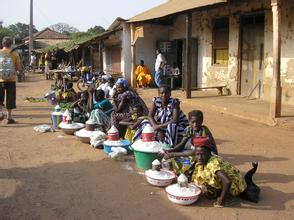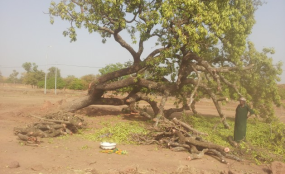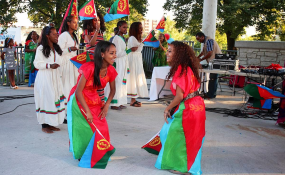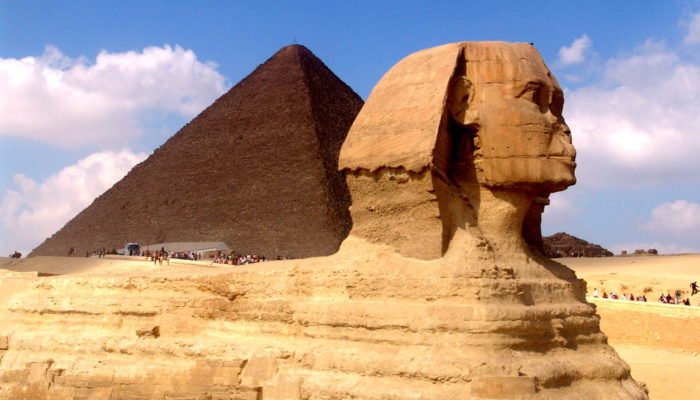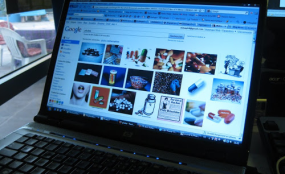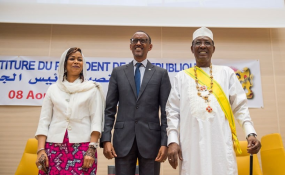On June 29, 2016, the Provisional National Commission on Reconciliation (CPRN) co-chaired by Guinea’s highest religious figures submitted its long awaited final report to President Alpha Condé. The report was the conclusion of a process that started on August 2011, when the president mandated the commission to listen to as many ordinary citizens and opinion leaders alike on how best to reconcile Guineans.
The country has had a tumultuous history since it gained independence in 1958 and political instability and violence during the 2010 presidential election further weakened national unity and deepened ethnic mistrust.
CPRN hired an international independent cabinet to conduct a thorough study on the kind of transitional justice mechanisms to set up for a successful national reconciliation procedure. The 300 page long report covers crimes and human rights violations committed from independence to 2015 of which the notorious are the gulag of Camp Boiro, the July 1985 events known as “Coup Diarra Traoré”, and the event of September 28, 2009 which has drawn attention from the International Criminal Court.
The report also focused the discussions on the search for truth, justice, reparation and rehabilitation, institutional reforms, and the future of Guinea and it made dozens of recommendations on how best to reconcile Guineans including the creation of a Truth, Justice, and Reconciliation Commission.
The Findings
The results of the study are interesting in many ways but not really surprising for who knows the traditional, cultural, and sociological landscape of the country. The report found that Guineans are overwhelmingly for reconciliation. Not only they are for it, they are also willing to forgive and look forward to a future living together in peace and harmony whereas seeing their differences as an asset rather than a source of division and/or tension.
However, the study shows that 75 percent of the respondents think that suspected perpetrators must be brought to justice.The majority of the respondents demand the right to justice and for the prosecution of suspected perpetrators of atrocities. As regards reparations, 62 percent demand compensation, 54 percent the return of property confiscated, 47 percent demand a public apology, 58 percent request perpetrators to ask for forgiveness, and another 51 percent want an apology from the State.
Looking forward, the majority of Guineans are confident about the country’s future, however, they think reforms at institutional levels must be taken to combat “ethnocentrism and reconcile all ethnic groups”. On the role of ethnicity in politics, almost 89 percent think politicians are using their ethnic groups for political purposes, thus it is not surprising that 68 percent of Guineans indicate that ethnicity has become a divisive factor. Notwithstanding these numbers, a thin majority (51 percent) of those consulted say that different ethnic groups live together peacefully.
The Recommendations
The Commission made 22 recommendations one of which being to institute through legislation a Truth, Justice, and Reconciliation Commission which will continue the work started by CPRN namely implementing its recommendations.
On the need to render justice, the Commission recommends that exemplary sanctions be taken against judicial actors who violate the laws and that the criminal justice system be strengthened to restore confidence between citizens and the judiciary. When it comes to reparations, CPNR advices urgent actions to be taken for the victims whose situation of vulnerability is documented and requires medical and psychological care and as far as long term reparations, it advises on a program that will take into account individual, collective, material and symbolic reparations.
Other recommendations include instituting September 28 of each year as a Day of Remembrance and Forgiveness, the search for missing persons and bodies of those killed, the identification of mass graves, an official public apology from the State including recognition of the facts and acceptance of its responsibility, judicial reforms, restoration of victims in their rights, and a guaranty of non-repetition.
The President’s Speech
While I agree with many journalists and commentators who commented about the fact that the President missed the opportunity to show a strong symbolic act of reconciliation when he left the room without shaking the hand of his opponent and main challenger during the last two presidential elections, I think that the President was by and large conciliatory.
In his speech during the ceremony, the President highlighted some issues in his view that would make the process run on a steep slope. Those following news from Guinea, know how much the president’s opinion counts on the life of the country in general and his support and buy-in for any program is crucial for it to succeed. Therefore, brainstorming on ways to address his worries could only contribute to advance the pace of the process.
For instance, the president said that reconciliation is difficult because “many of the victims are also perpetrators”. Though I agree with him on the face of his statement, this element should not however be used as an excuse for inaction. It happened that during the regime of Sekou Touré (1958 – 1984) public figures who were seen as executioners at the sinister Camp Boiro ended up themselves in the same concentration camp.

